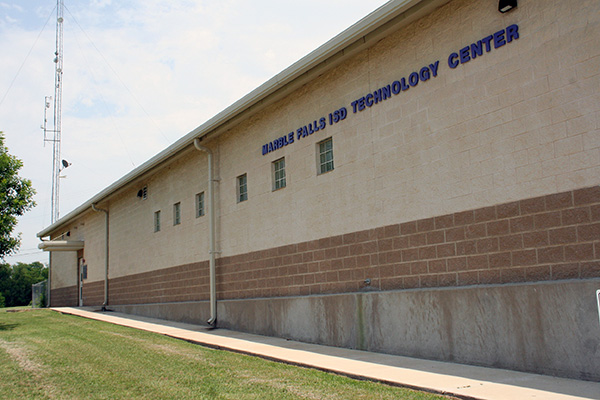MFHS faces Internet security questions regarding laptop take-home program

The Marble Falls Independent School District has launched a program to send Google Chromebooks home during the summer with all students in 10th-12th grades. Parents must first attend one of a series of meetings to learn about the program and insurance for the devices. File photo
CONNIE SWINNEY • PICAYUNE STAFF
MARBLE FALLS — Grandmother Londa Chandler balked at the idea that a new school district program would allow nearly all high school students to take a school-issued, laptop computer home for the summer.
“I understand that technology is the wave of the future. I have an iPad, an iPhone, a laptop — the whole bit. My grandkids even use it,” said Chandler, who has three grandchildren in the Marble Falls Independent School District. “I’m concerned if they’re going to have locks on them so kids won’t have access to porn sites. Do they have built-in spyware? Are they going to spend their day on Facebook? I don’t think the schools are going to have any control over them.”
To answer those questions and discuss the Spark Learning program, which encompasses the Google Chromebook initiative, MFISD will host a series of meetings for parents.
The sessions are 6 p.m. May 11, 13, 14, 18 and 20 in the high school auditorium, 2101 Mustang Drive.
Parents must sign up for at least one meeting for their child to be eligible to take home a device for the summer.
“The meetings will cover a lot of the questions such as the acceptable use policy. In signing that, that’s one of the reason we want parents to attend these meetings,” MFISD facilitator Bruce Peckover said. “We talk about what’s appropriate use of the device and what should and shouldn’t be accessed.
“It comes down to setting up a partnership between schools, students and parents to coach and appropriately monitor the use of the devices,” he added.
School officials said they want to prepare students for a transition into regular studies and homework assignments using the devices.
“We would be doing a disservice to our kids in not preparing them to operate in the 21st century environment that’s already expected in trade schools, community colleges and four-year universities,” Peckover said.
The district paid for the Google Chromebooks with a portion of a $6.5 million bond package approved by voters in May 2014.
“The purpose of the Google Chrome(books) project is to get a mobile device, a computer in the hands of every student,” said Robert Keith, MFISD executive director of technology. “Teachers can submit homework to students,
“We’re going to issue the devices out to every single student in grades 10th through 12th,” he said. “We’ll phase in the other grades in the following year.”
An effort to prepare students for college-level learning and the workforce prompted the initiative.
“Textbooks are becoming digital. Kids are learning in different ways than they have in the past,” Keith said. “Giving kids access to technology who wouldn’t normally have access to technology just further enhances their ability to succeed in higher education.”
Educators expect to use the devices not only to make students more comfortable with the technology but for group projects, homework, reading and laboratory assignments.
“The Chromebooks are less expensive,” he said. “It gives them a chance to use a lot of applications that are similar to Microsoft, but they’re in the Google platform. They’re available for free.”
Eventually, the district wants to provide take-home devices to all students in middle through high school.
To familiarize younger students with the technology, educators at the elementary schools have trained and will offer in-class access to devices to their students.
“We’re doing some Spark training where we’re sending teachers through some specialized training in the elementary level,” Keith said. “When these teachers are finished, they get a set of 25 iPads. The focus really isn’t on the technology but on a new style of teaching.
“They integrate their lesson plans with technology,” he added. “Most of them are adapting to it, and accepting the iPad and having a lot of success with them.”
While the district provides access in class, some parents are concerned about access and damage at home.
Chandler said her son, who cares for her grandchildren, considers any additional expenses as “luxuries.”
“I paid $2,000 for my Apple. I don’t hand it out to my 10-year-old grandson. Of course, if anything happens to the devices, you have to pay for it or pay for the insurance,” she said. “My son doesn’t have Internet at his house, so what good does the laptop do him? And he can’t afford to pay for insurance for three kids.
“Those are luxuries,” Chandler added. “I don’t think it’s well thought out.”
Peckover said even students without Internet at home can still work on the devices.
“There’s lots of opportunities for access to Internet at school,” Peckover said. “There’s a lot of things they can do off-line, too. And then when they get back to school, they can then upload information and files for their assignments.”
Officials said the initiative uses Google-based secure user IDs and secure passwords, and on-campus Internet searches and activities will be subject to an on-campus filtered network.
“The network safeguards are in place,” Peckover said. “In addition to the school, we hope the parents will actively monitor their children’s usage.”
connie@thepicayune.com


